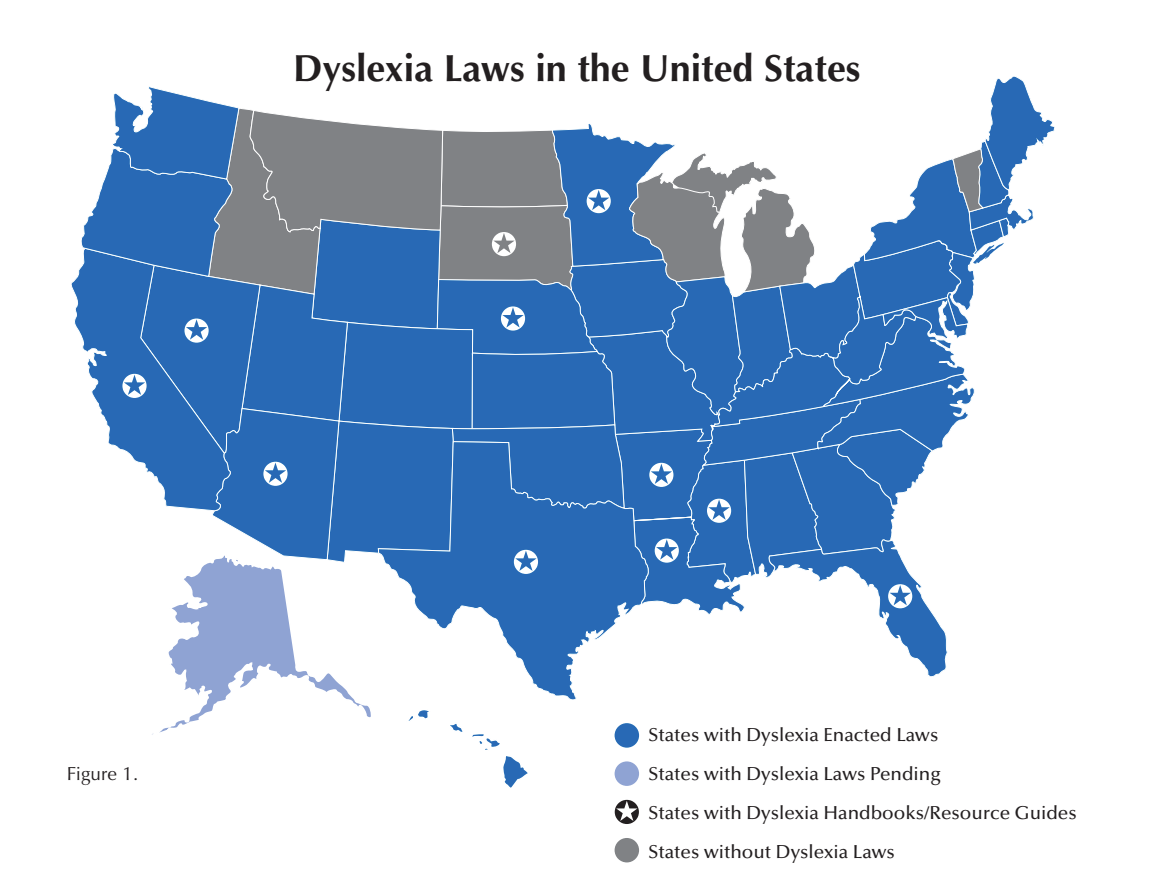
Texas and Arkansas in particular have comprehensive laws, and recently California made headlines as it beefed up its universal screening and issued a high-quality, comprehensive guidance guidebook on dyslexia (Tennessee and a handful of other states have also issued dyslexia guidance).
A comprehensive list of dyslexia laws from state to state can be found here.
But parents of dyslexic students say that having the laws on the books is just the first step to getting help, according to Mather. Getting schools and districts to pay attention is more important. “Hopefully this increased spotlight on dyslexia will result in many more students getting the kind of help and support that they need to become avid, fluent readers,” she says.
ADVOCATES FOR NECESSARY SUPPORT: THE CRUCIAL ROLE OF PARENTS AND CAREGIVERS
After several years of advocating for her dyslexic daughter in school settings, Nashville, Tennessee, parent Anna Thorsen began to realize how crucial parents and caregivers were to helping students get the interventions they need.
A former lawyer, Thorsen now spends her days advocating for dyslexic students through the Dyslexia Advisory Council for the state of Tennessee and is a member of Decoding Dyslexia Tennessee. The parent role is complex, Thorsen says, and collaborating with the school requires both strength and understanding, knowing when to push and when to hold back.
As a parent advocate, you have to be fierce and tireless. Many parents of children with special needs say they feel so much stress because they are their child’s caregiver, IEP case manager, tutor, advocate and lawyer, all wrapped into one. With all of the other demands of work and family life, these roles can be overwhelming and many parents don’t have the luxury of time at the end of a busy work week to dedicate themselves to being the all-around expert on their child’s education. After years of playing all these roles, parents get worn out and really must struggle to work to build collaborative relationships with schools.
Thorson offers the following advice and tips for parents and caregivers of dyslexic children who may be facing the same issues.
5 TIPS TO BUILD A COLLABORATIVE RELATIONSHIP WITH YOUR CHILD’S SCHOOL
By Anna Thorsen
Building a collaborative relationship takes a lot of work, and it is not easy. I certainly do not always do a good job at it myself, especially when I am tired, angry and stressed out. But what I always tell parents is that you are stuck working with your school, your teachers and your school administration for a year or many years. You do not need them to write you off as a crazy parent. Here are my tips to build a strong relationship.
1. When it comes to your dyslexic child, don’t be one-dimensional
It’s crucial to keep communication flowing with your child’s school, so don’t strain communications by only talking about your child’s problems or harass teachers about something that went wrong in class. If you are “that” parent, teachers and administrators will begin to avoid you. Instead, I advise parents to say hello to your child’s teacher when you see them, tell a funny story or ask how they are doing. If possible, try not to make every encounter about your child’s reading problems; it goes a long way in building a trusting relationship with your child’s teacher.
2. Make yourself invaluable
If possible, become a part of the school in some way, by donating your time. Volunteer, mentor, or do something to show teachers and administration that you want to be part of the school. If it’s not possible to spend more time at school, then ask teachers or administration how you can help. Forming relationships with your school will build trust and only help your student.
3. Don’t be a bull in a china shop
Instead of demanding action, connect with teachers and administrators on an emotional level. After all, they are humans, too, and many have kids of their own. Describe what’s really happening in your family and don’t be afraid to share your emotions–there’s nothing wrong with saying “I am scared for my child,” or “I have been losing sleep worrying.”
4. Bring conversations back to your child
In meetings, remind people that you are talking about a real, live child, and not a data point. Bring a picture or video of your child. Ask for your child to come by the meeting to tell the school group things are going well and things that are hard. Tell the school about your child’s dreams and abilities outside of school. Once the team connects with you and your child, you will be more successful. We, as humans, help people we know and have a harder time denying someone what we have a connection to.
5. When all else fails, don’t be afraid to be a bull in a china shop
If nothing is working, then you have to be willing to take it to the next level until you get what your child needs. I always advise parents to use force as an absolute last resort, and try to assume that schools will do the right thing.
Thorsen, along with Eileen Miller, founding member of Decoding Dyslexia, TN, and of Ignite Dyslexia, offer the following hard-won wisdom regarding Individualized Education Program (IEP) meetings:
12 Tips to Remember in an IEP Meeting
1. Never sign the IEP document in the meeting. You may sign that you were present at the meeting, but don’t sign off on the IEP itself. Go home and read it. Make sure it is what you want before you sign.
2. Never go to an IEP meeting alone. Bring an advocate, a spouse or a friend.
3. If possible, record the meeting. It’s difficult to understand everyone at once.
4. Ask that people in the room at the IEP meeting introduce themselves and what their role is. Write down everyone’s name and position. You may need to follow up with them.
5. Take your time and have the IEP team meeting go at your pace. Don’t feel rushed.
6. Ask for clarification of acronyms and educational terms.
7. Get everything in writing. If it is not in writing — it never happened.
8. Be prepared and know what you want. Do your homework on your child’s disability, be familiar with the law and know your rights.
9. It helps to have a binder to keep all the information on your child.
10. Ask the team to go over documents with you.
11. Consider bringing your child to a portion of the meeting. It helps the team to hear from them.
12. Never give up. You are the parent and you know your child better than anyone.
More Parent Resources Can be Found Here:
• How You Can Help Your Child with Dyslexia, Understood.org
• Support and Resources for Parents, Learning Disabilities Association of America
• 10 Things Parents Need to Know to Help a Struggling Reader, Yale Center for Dyslexia & Creativity
• Dyslexia: Three Strategies for Parents, NPR
• Six Ways Parents Can Help, Nessy.com



